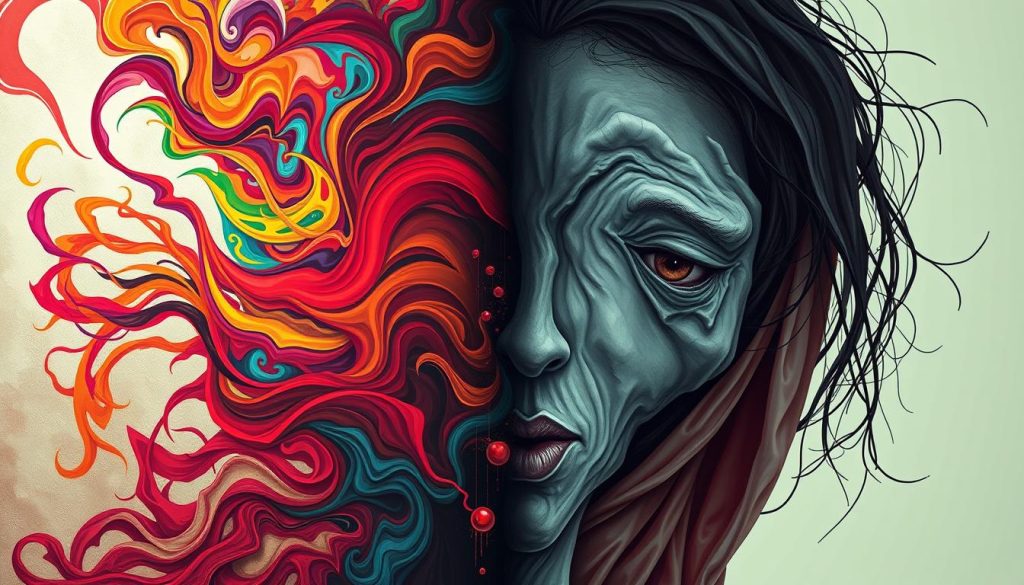In the United States, many mental health conditions affect people’s lives. Manic Depressive Disorder, also known as Bipolar Disorder, is unique. It causes mood swings from mania to depression. This makes it hard for those affected to find support.
This article aims to help those with Manic Depressive Disorder. It wants to inform, offer comfort, and connect with them. It goes beyond just talking about the condition.
This guide will explore what it’s like to live with this illness. It will help you understand the intense feelings of happiness and sadness. We want you to know you’re not alone.
The journey ahead will teach you about manic and depressive episodes. It will also cover how to get diagnosed and the treatment options available. Our goal is to help you find stability.
Key Takeaways
- Comprehensive insight into the spectrum of Mania and Depression in Bipolar Disorder.
- Empathetic guidance on how to lead a fulfilling life while managing Manic Depressive Disorder.
- Tools for early detection and the significance of a timely diagnosis for better management.
- An overview of treatment methodologies, blending medication with therapeutic strategies.
- Lifestyles adjustments and coping techniques that aid in day-to-day stability.
- Support options and resources within communities, spotlighting the importance of a strong support network.
Understanding Manic Depressive Disorder: An Overview
Manic depressive disorder, also known as bipolar disorder, is a condition with mood swings. It includes feeling very high and energized, known as mania, and feeling very low and sad, known as depression. This section will explore the medical terms, types of episodes, and risk factors of this complex condition.
Definition and Terminology
The term “manic depressive disorder” is now called bipolar disorder. It causes mood swings that make daily life hard. Knowing about this disorder helps in finding better ways to manage it, like using Mood Stabilizers and Psychotherapy.
Types of Episodes
There are three main types of episodes: manic, hypomanic, and depressive. Manic episodes are when someone feels too high and active. Depressive episodes are when someone feels very sad and has low energy. Hypomanic episodes are similar but less intense and don’t usually stop someone from functioning.
Cyclothymia, a milder form of bipolar disorder, has less severe mood swings. But, it can still greatly affect someone’s life.
Causes and Risk Factors
Understanding manic depressive disorder involves genetics, neurobiology, and environment. Genetics play a big role, but stress and big life changes also matter. Knowing how these factors work together helps in finding better treatments.
It’s important to understand the complex nature of manic depressive disorder. Treatment can include medication like mood stabilizers or therapy like psychotherapy. Knowing the basics of the disorder can greatly improve treatment results and help patients feel better.
Recognizing Symptoms of Manic Depressive Disorder
It’s key to spot symptoms of manic depressive disorder early. This helps in managing and treating it well. Using lithium and electroconvulsive therapy is crucial for controlling mania and depression.
Manic Phase Symptoms
In the manic phase, people feel very energetic and don’t need much sleep. They also do more than usual. Mood swings can cause them to act impulsively and recklessly, without realizing it.
Depressive Phase Symptoms
The depressive phase brings deep sadness and a loss of interest in things they once enjoyed. Changes in appetite and sleep patterns are common. Feeling worthless or having thoughts of death can really affect their daily life.
Mixed Episodes
Mixed episodes mix symptoms of both manic and depressive phases. People might feel both energized and sad at the same time. This can confuse them and make it hard to make good decisions.
Knowing these symptoms is important for getting help quickly. For more tips on managing manic depressive disorder, check out detailed guides.

| Phase | Common Symptoms | Treatment Options |
|---|---|---|
| Mania | High energy, reduced sleep, impulsivity | Lithium, Antipsychotics |
| Depression | Sadness, loss of interest, fatigue | Antidepressants, Psychotherapy |
| Mixed | Both manic and depressive symptoms | Electroconvulsive Therapy, Mood Stabilizers |
Diagnosis: How is Manic Depressive Disorder Identified?
Diagnosing manic depressive disorder, also known as bipolar disorder, is a detailed process. It involves understanding mood swings and using various tools to diagnose. The goal is to catch it early to improve treatment and outcomes.
Clinical Assessment
Healthcare providers do thorough checks during clinical assessments. They might use mood stabilizers to see how the person reacts. This helps them understand the mood swings’ severity and how often they happen.
Diagnostic Criteria
The DSM-5 sets clear criteria for diagnosing bipolar disorder. Doctors look for specific mood swings and symptoms. They need to see at least one episode of mania or hypomania and patterns of behavior.
Importance of Early Detection
Finding bipolar disorder early can change treatment and life quality. Early treatment with therapy and mood stabilizers can manage symptoms better. This helps avoid severe mania or depression episodes.
| Phase | Signs | Impact of Early Diagnosis |
|---|---|---|
| Mania | High energy, reduced need for sleep, impulsivity | Improved management of high-energy phases |
| Depression | Low energy, feelings of hopelessness, withdrawn behavior | Prevention of severe depressive episodes |
| Hypomania | Elevated mood, increased productivity, hyperactivity | Early therapeutic interventions |

Treatment Options for Manic Depressive Disorder
Managing manic depressive disorder requires a mix of medications, psychotherapy, and lifestyle changes. These are tailored to fit each person’s needs. We’ll look at ways to handle both the manic and depressive phases.
Medication Types and Their Effects
Mood stabilizers like lithium are key in treating manic depressive disorder. They help reduce mania episodes. Other drugs, like antipsychotics and antidepressants, may also be used. It’s important to watch for side effects and adjust treatments as needed. Learn more about bipolar disorder treatments to understand how these drugs help balance the brain.
Psychotherapy Approaches
Psychotherapy is also crucial in treating manic depressive disorder. Cognitive-behavioral therapy (CBT) and interpersonal therapy are especially helpful. These therapies aim to change negative thought patterns and improve relationships. They also help manage stress and daily life, which is vital in treatment plans.
Lifestyle Modifications
Changing your lifestyle can also help manage symptoms. This includes keeping a regular sleep schedule, exercising regularly, and eating well. Teaching patients and caregivers about these daily habits is key to improving well-being. Also, avoiding alcohol and drugs is important for better treatment results.

For severe cases, Electroconvulsive Therapy (ECT) is an option. ECT can help those with severe bipolar disorder who haven’t responded to other treatments. It sends electric currents to the brain to quickly improve symptoms, making it a valuable but less common treatment.
Dealing with manic depressive disorder needs a mix of medication, therapy, and lifestyle changes. Tailoring treatments to each person’s needs can lead to a stable and fulfilling life. It’s important to keep learning about mood stabilizers, therapy, and lifestyle practices. This is as important as understanding Alzheimer’s disease, as shown in the guide to Alzheimer’s.
Coping Strategies for Individuals and Families
Living with Bipolar Disorder is tough for both the person affected and their family. Using Psychotherapy, building a strong Support Network, and managing Stress can improve life quality. Here are ways to build resilience and stay well.
Building a Support Network
Having a solid support network is crucial for those with Bipolar Disorder. This network should include doctors, family, friends, and peers who get it. A diverse group of supporters creates a positive environment for stability.
Therapy plays a big role in building this network. Therapists offer support and teach strategies to involve loved ones.
Stress Management Techniques
Reducing stress is key to avoiding manic and depressive episodes in Bipolar Disorder. Mindfulness, meditation, exercise, and good sleep habits help a lot. These activities help keep mood swings in check and improve focus.
Maintaining a Routine
Stability is essential in managing Bipolar Disorder. Keeping a regular routine is a big part of this. Schedules for meals, meds, sleep, and activities reduce stress and unpredictability.
This routine helps the person and their family plan and offer support better.
| Technique | Description | Benefit |
|---|---|---|
| Mindfulness | Engaging fully in the present moment | Reduces anxiety and mood instability |
| Meditation | Practice of concentrated focus to calm the mind | Improves mental clarity and stress management |
| Physical Activity | Regular exercise routines | Enhances mood through release of endorphins |
| Sleep Hygiene | Maintaining consistent sleep patterns | Promotes emotional and psychological health |

The Role of Support Groups and Community Resources
For those dealing with Bipolar Disorder, which includes Mania and Depression, Support Groups and Community Resources are key. They offer emotional support and practical help. This is tailored to the needs of those with Bipolar Disorder and their families.
Finding the Right Support Group
Finding a Support Group that fits your needs is crucial for recovery. The right group makes you feel part of a community. It’s where you can share experiences and learn new ways to cope.
When looking for a group, consider what it focuses on. Think about how often it meets and the experience of the leader.
Benefits of Peer Support
Support from others with Bipolar Disorder can change how you manage Depression and Mania. Sharing your story and challenges helps reduce feelings of isolation. It also gives you new ideas on how to cope.
These interactions can inspire hope. They offer fresh views on treatment and living with the disorder.
Resources Available in the U.S.
The U.S. has many Community Resources for Bipolar Disorder. There are national campaigns and local programs. They offer educational materials, access to doctors, and emergency help when needed.
It’s important for individuals and families to find these resources. They help stay informed and prepared for managing the disorder.

Living with Manic Depressive Disorder: Daily Challenges
Living with manic depressive disorder brings daily challenges. The ups and downs affect personal life, work, and social interactions. This section looks at these challenges and how to deal with them.
Managing Relationships
Keeping relationships healthy is tough for those with manic depressive disorder. Mania can make people too optimistic and social, straining bonds. Depression leads to withdrawal, causing misunderstandings. Talking openly and seeking help are key to understanding and support.
Employment Considerations
Work stability is a big issue. Mood swings make it hard to keep a job. Employers and coworkers may not get it. Getting flexible work hours or a supportive team can help.
Social Life Impacts
Social life is also affected. Mania can lead to risky behavior, while depression causes withdrawal. Learning to balance and understand one’s emotions is crucial. Support groups and social skills training can help a lot.
Here is a comparative table that elucidates the effects on relationship management, employment, and social life during manic and depressive phases:
| Aspect | Impact During Mania | Impact During Depression |
|---|---|---|
| Relationships | Over-engagement, potential conflicts | Withdrawal, lack of communication |
| Employment | High productivity levels but often erratic | Lowered productivity and frequent absences |
| Social Life | Risk-taking behaviors, large social circles | Social isolation, limited interactions |
Understanding the effects of manic depressive disorder is key. Tailored therapies and support are essential. With the right help, people can lead balanced and fulfilling lives despite the challenges.
Psychological and Emotional Aspects of the Disorder
Living with manic depressive disorder deeply affects one’s mind and feelings. This part looks at how people deal with the mix of emotions and views caused by the disorder.
Managing Stigma and Misconceptions
Stigma is a big obstacle for those seeking help for manic depressive disorder. Wrong ideas about the disorder lead to bad assumptions, making things worse for those affected. It’s key to teach the public to fight stigma to help those suffering emotionally.
Impact on Self-Esteem
Manic depressive disorder can really hurt a person’s self-esteem. It makes them feel alone and not understood. It’s important to see the real value of each person, even with health issues, to help build confidence and strength.
Strategies for Positive Thinking
Thinking positively is key to managing emotional health. Ways to encourage optimism can lessen the disorder’s effects, leading to a more balanced and happy life.
| Strategy | Description | Impact on Self-Esteem |
|---|---|---|
| Mindfulness | Practicing mindfulness helps in staying present and aware, reducing feelings of depression and anxiety. | Increases self-awareness and acceptance. |
| Journaling | Writing down thoughts and feelings can serve as a therapeutic outlet for emotional expression. | Boosts self-understanding and control over emotions. |
| Positive Affirmations | Repeating positive affirmations can reshape thinking patterns and reduce the power of negative self-perceptions. | Improves beliefs in personal capabilities and value. |
Moving Forward: Long-Term Outlook and Management
Living with manic depressive disorder means always focusing on health and looking forward. It’s about continuous care and watching symptoms closely. By understanding and managing their health, people can find stability and happiness.
Importance of Continuous Care
Continuous care is key to managing manic depressive disorder. It’s more than just doctor visits. It’s a whole approach that includes taking medicine, therapy, and a support system. This way, people can handle unexpected problems and avoid severe episodes.
Monitoring Symptoms Over Time
Manic depressive disorder’s ups and downs need careful watching. This helps spot mood and behavior changes early. Keeping track of these helps find patterns and triggers, making treatments more effective. It’s a way for people to take charge of their health.
Goals for a Fulfilling Life
Setting achievable goals is crucial for those with manic depressive disorder. Goals help keep hope alive and guide progress. They show that a fulfilling life is possible, even with challenges. Reaching these goals takes patience and resilience, but every step is a victory.
FAQ
Q: What is manic depressive disorder?
A: Manic depressive disorder, also known as bipolar disorder, is a mental health condition. It causes big mood swings. These swings include feeling very high, or manic, and very low, or depressed.
Q: How do manic episodes differ from depressive episodes in bipolar disorder?
A: Manic episodes make people feel very energetic and happy. They might also feel irritable or act impulsively. Depressive episodes, on the other hand, make people feel sad and hopeless. They lose interest in most things.
Q: What is cyclothymia, and how is it related to bipolar disorder?
A: Cyclothymia is a milder version of bipolar disorder. It has less severe mood swings. Even though the highs and lows are not as extreme, they can still affect daily life.
Q: What causes manic depressive disorder?
A: The exact cause is not fully known. It’s thought to be a mix of genetics, biology, and environment. These factors all play a role in developing manic depressive disorder.
Q: Which treatment options are available for manic depressive disorder?
A: Treatment often includes medication, like mood stabilizers and antipsychotics. It also includes psychotherapy, lifestyle changes, and sometimes electroconvulsive therapy (ECT).
Q: How is manic depressive disorder diagnosed?
A: Diagnosis involves a detailed clinical assessment. This includes a psychiatric evaluation and comparing symptoms to the DSM-5 criteria.
Q: Can lifestyle modifications help manage bipolar disorder?
A: Yes, making lifestyle changes can help. Regular exercise, a healthy diet, consistent sleep, and stress reduction support treatment and manage symptoms.
Q: Why is early detection of bipolar disorder important?
A: Early detection leads to timely treatment. This can prevent the disorder from getting worse and reduce symptoms. It improves long-term outcomes.
Q: What role do support networks play for those with bipolar disorder?
A: Support networks, like friends and family, are crucial. They offer emotional support, help manage challenges, and provide access to resources and coping strategies.
Q: How does manic depressive disorder affect daily life and interpersonal relationships?
A: Mood swings can make it hard to keep relationships stable and maintain employment. However, with treatment and strategies, individuals can overcome these challenges.
Q: What is the long-term outlook for someone with manic depressive disorder?
A: With the right treatment and self-management, many people with bipolar disorder can live fulfilling lives. Continuous care and monitoring are key for long-term stability.


















